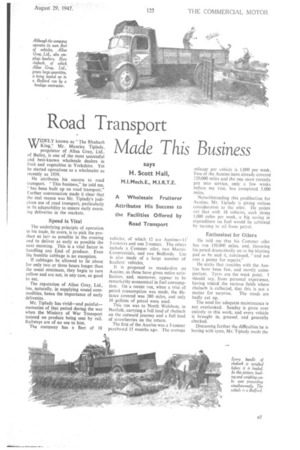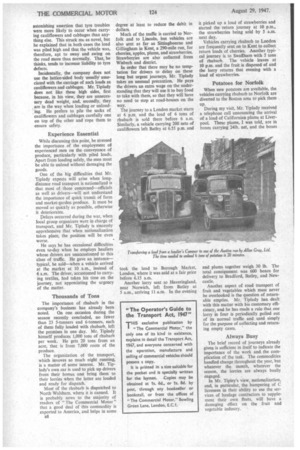Road Transport Made This Business
Page 41

Page 42

If you've noticed an error in this article please click here to report it so we can fix it.
says H. Scott Hal', mech.E., M.1.R.T.E. WIDELY known as 'The Rhubarb King,': Mr. Maurice Tiplady, proprietor of Allan Gray, Ltd., of Batley, is one of the most successful and best-known wholesale dealers in fruit and vegetables in Yorkshire. Yet he started operations as a wholesaler as recently as 1939.
He attributes his success to road transport. "This business," he told me, "has been built up on road transport." Further conversation made it clear that the real reason was Mr. Tiplady's judicious use of road transport, particularly in its adaptability to ensure early mornIna deliveries in the markets.
Speed is Vital The underlying principle of operation in his trade, he avers, is to pick the produce as late as possible in the evening and to deliver as early as possible the next morning. This is a vital factor in handling any gind of produce. Even the humble cabbage is no exception.
If cabbages be allowed to lie about for only two or three hours longer than the usual minimum, they begin to turn yellow and are not, in any case, so good to eat.
The reputation of Allan Gray, Ltd., lies, naturally, in supplying sound commodities, hence the importance of early deliveries.
Mr. Tiplady has vivid—and painful— memories of that period during the war when the Ministry of War Transport insisted on produce being sent by rail. Railways are of no use to him.
The company has a fleet of 18 vehicles, of which 12 are Austins-11. 5-tonners and one 2-tonner. The others include a Commer oiler, two MorrisCommercials, and two Bedfords. Use is also made of a large number of hauliers' vehicles.
It is proposed to standardize on Austins, as these have given entire satisfaction, and, moreover, appear to he remarkably economical in fuel consumption. On a recent run, when a trial of petrol consumption was made, the distance covered was 380 miles, and only 16 gallons of petrol were used.
This run was to North Walsham. in Norfolk, carrying a full load of rhubarb on the outward journey and a full load of strawberries on the return.
The first of the Austins was a 5-tonner purchased 15 months ago. The average
mileage per vehicle is 1,000 per week. Two of the Austins have already covered 120,000 miles and the one most recently put into service, only a few weeks before my visit, has completed 5,000 miles.
Notwithstanding this predilection for Austins, Mr. Tiplady is giving serious consideration to the oiler. He points out that with 18 vehicles, each doing 1,000 miles per week, a big saving in expenditure on fuel would be achieved by turning to oil from petrol.
Enthusiast for Oilers
He told me that his Cornmer oiler has run 150,000 miles, and, throwing his pencil dramatically on to his blotting pad as he said it, continued, "and not cost a penny for repairs."
He states that troubles with the Austins have been few, and mostly unimportant. Tyfts are the weak point. I should say, from personal experience, having visited the various fields where rhubarb is collected, that this is not a matter for surprise. The roads are badly cut up.
The need for adequate maintenance is not overlooked. Sunday is given over entirely to this work, and every vehicle is brought in, greased, and generally checked.
Discussing further the difficulties he is having with tyres, Mr. Tiplady made the astonishing assertion that tyre troubles were more likely to occur when carrying cauliflowers and cabbages than anything else. This struck me as novel, but he explained that in both cases the load was piled high and that the vehicle was, therefore, apt to sway and swing on the road more than normally. That, be thinks, tends to increase liability to tyre defects.
Incidentally, the company does not use the lattice-sided body usually associated with the carriage of such loads as cauliflowers and cabbages. Mr. Tiplady does not like these high sides, first because, in his view, they are unnecessary dead weight, and, secondly, they are in the way when loading or unload: ing. He prefers to pile the sacks of cauliflowers and cabbages carefully one on top of the other and rope them to ensure safety.
Experience Essential
While discussing this point, he stressed the importance of the employment of experienced men on the conveyance of produce, particularly with piled loads. Apart from loading safely, the men must be able to unload without damaging the goods.
One of the big difficulties that Mr. Tiplady expects will arise when longdistance road transport is nationalized is that most of those concerned—officials as well as drivers—will not understand the importance of quick transit of farm and market-garden produce. It must be moved as quickly as possible, otherwise it deteriorates.
Delays occurred during the war, when local group organizers were in charge of transport, and Mr. Tiplady is sincerely apprehensive that when nationalization takes place, the position will be even worse. • He says he has occasional difficulties even to-day when he employs hauliers whose drivers are unaccustomed to this class of traffic. He gave an instance— typical, he said—when a vehicle arrived at the market at 10 a.m., instead of 6 a.m. The driver, accustomed to carrying textiles, had taken his time on the journey, not appreciating the urgency of the matter.
Thousands of Tons
The importance of rhubarb in the company's business has already been noted. On one occasion during the season recently concluded, no fewer than 23 5-tonners and 6-tonners, each of them fully loaded with rhubarb, left the premises in one day. Mr. Tiplady himself produces 1,000 tons of rhubarb per week. He gets 20 tons from an acre, that is from 7,000 roots of the produce.
The organization of the transport, which invoves so much night running, is a matter of some interest. Mr. Tiplady's own car is used to pick up drivers from their homes and bring them to their lorries when the latter are loaded and ready for dispatch.
Most of the rhubarb is dispatched to North Walsham, where it is canned. It is probably news to the majority of readers of "The Commercial Motor" that a good deal of this commodity is exported to America, and helps in some n8 degree at least to reduce the debit in dollars, Much of the traffic is carried to Norfolk and to Lincoln, but vehicles are also sent as far as Sittingbourne and Gillingham in Kent, a 290-mile run, for cherries, apples, plums, and strawberries. Strawberries are also collected from Wisbech and district.
In order that there may be no temptation for drivers to delay on these long but urgent journeys, Mr. Tiplady takes an unusual precaution. He pays the drivers an extra wage on the understanding that they will use it to buy food to take with them, so that they will have no need to stop at road-houses on the way.
The journey to a London market starts at 6 p.m. and the load of 6 tons of rhubarb is sold there before 6 a.m. Similarly, a vehicle carrying 200 nets of cauliflowers left Batley at 6.55 p.m. and took the load to Borough Market, London, where it was sold at a fair price before 6.15 a.m.
Another lorry sent to Haveringland, near Norwich, left from Batley at 5 a.m., arriving 11 a.m. In the evening it picked up a load of strawberries and started the return journey at 10 p.m., the strawberries being sold by 5 a.m. next day.
Vehicles carrying rhubarb to London are frequently sent on to Kent to collect return loads of cherries. Another typical journey is to Swaffham with 5 tons of rhubarb. The vehicle leaves at 10 p.m. and the fruit is disposed of and the lorry returns that evening with a load of strawberries.
Potatoes for Norfolk
When new potatoes are available, the vehicles carrying rhubarb to Norfolk are diverted to the Boston area to pick them up.
During my visit, Mr. Tiplady received a telephone call announcing the arrival of a load of Californian plums at Liverpool. These plums, I was told, are in boxes carrying 241b. net, and the boxes and plums together weigh 30 lb. The total consignment was 600 boxes for delivery to Bradford, Batley, and Newcastle.
Anothet aspect of road transport of fruit and vegetables which must never be overlooked is the question of returnable empties. Mr. Tiplady has dealt with this matter with his customary efficiency, and he has made a rule that one lorry in four is periodically pulled out of its normal traffic and used simply for the purpose of collecting and returning empty cases. '
Always Busy
The brief record of journeys already given is sufficient in itself to indicate the importance of the work and the complication of the task. The commodities handled change throughout the year, but whatever the month, whatever the season, the lorries are always busily engaged.
In Mr. Tipley's view, nationalization, and, in particular, the hampering of C licensees in their ability to use the services of haulage contractors to supplement their own fleets, will have a damaging effect on the fruit and vegetable industry.












































































